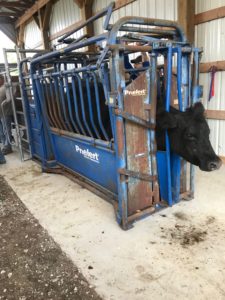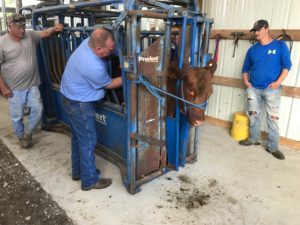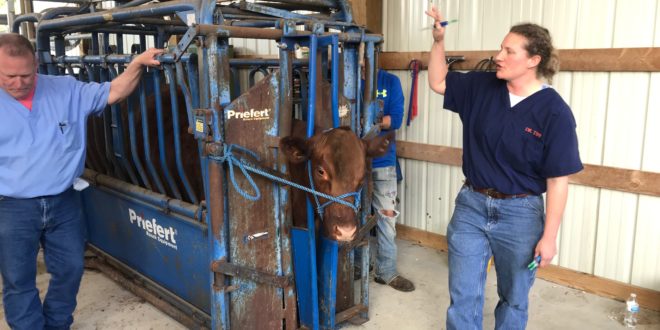With spring in the air and summer just around the corner, local beef producers have started planning out vaccination programs for their herds.
Putnam County UT Extension Agent Wayne Key said it is wise to have a vaccination and health plan for cattle.
“This is the time of the year when all our beef cattle producers will start getting and setting the animals up so that the parasites in the pastures and our fields,” Key said. “Worms, ticks, things like that, aren’t affecting their health, wellbeing, their reproducibility, and their longevity.”

Vaccinations are administered while the cow stands in a chute. (Photo: Tess Simpson)
The Extension office prepared a vaccination and safety demonstration for the farmers at Charles Curtis’s Double C Shorthorn Farm in Rickman on May 6.
“I was raised in the cattle business, my dad started my brother and I with some shorthorn heifers and grown that,” Curtis said. “I have shown for many years and enjoyed it and loved it. And that’s the only thing I want to fool with.”
Dr. Tiffany Kranz with the Livingston Veterinary Clinic demonstrated the appropriate way to give cattle vaccinations with a vaccination gun.
“We are going to give this girl some shots here. One thing you want to do, you don’t want to give the shots all on one side,” Kranz said. “So most of the time, you want to try to keep your gram-negatives on different sides, not something you necessarily have to get into what bacteria is what.”
Kranz said beef producers should attempt to give live vaccinations from the beginning of each cow’s life.
The live vaccine, also I think, is a better vaccine if you give them on the protocol. The thing you got to remember about live vaccines is if your cattle have never had live vaccines,” Kranz said. “They have to have it while they are still open. You can’t give it to a pregnant cow that has never had it or you are going to abort her, or you have a chance of aborting her.”

Vaccinations protect cattle from common viruses. (Photo: Tess Simpson)
To avoid aborting pregnant cows, Kranz said some vaccine manufacturers offer a mixture of dead and live vaccinations.
“There is a product Zoetis makes called Cattle Master. It actually has part live and part killed in the same vaccine. The kill part of it is the [Bovine Viral Diarrhea] which causes abortions. So, therefore, you can give it to pregnant cows. The live part of it is your Leptospirosis and stuff that has the [Hardjo-Bovis]. And that is what you want on your cows. But the newest lepto is the Hardjo-Bovis, that is something you want to get in your cows if you can. That is the most common Lepto we see now.”
The demonstration emphasized the importance of building immunity to diseases from birth. Kranz said calves should receive live vaccinations.
“I do want to always want to give your calves live vaccine. That’s just me, I think its the best vaccine out there. I have people that are kind of leery about live vaccines, think it kills their calves. It will give them a higher titer and a better reaction to it,” Kranz said. “If your cows are pretty sick, it may send them over the edge, but most of your calves, if they are on your farm, you won’t have to worry about that.”
Kranz said the key to a healthy herd rests in an adequate disease protection. Vaccinations protect cows and calves from common viruses, such as Infectious Bovine Rhinotracheitis (IBR) and Bovine Viral Diarrhea (BVD).
 News Talk 94.1/AM 1600 Where The Upper Cumberland Talks
News Talk 94.1/AM 1600 Where The Upper Cumberland Talks







